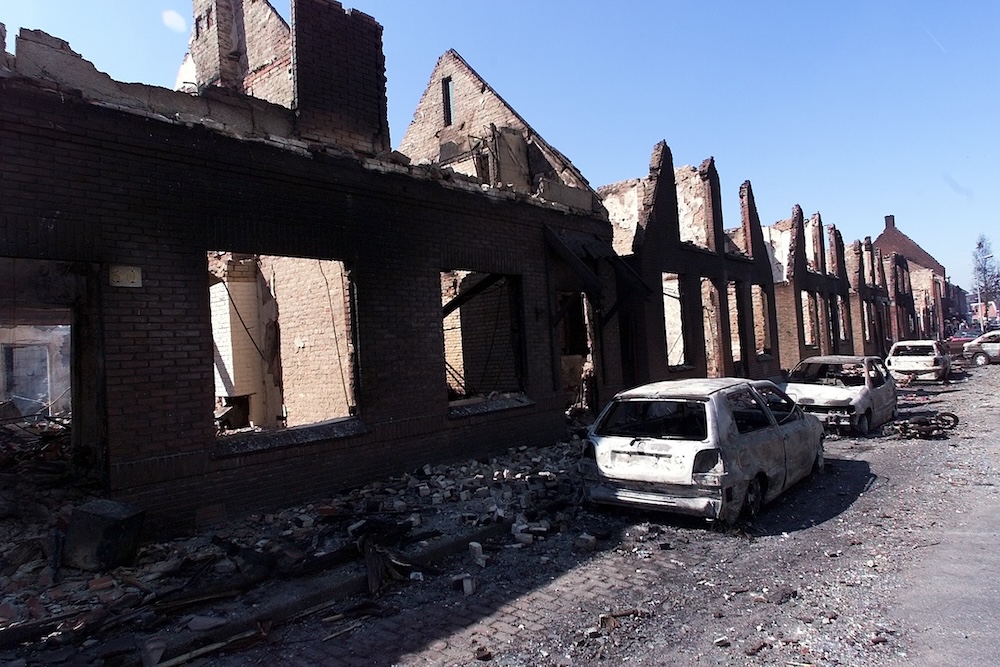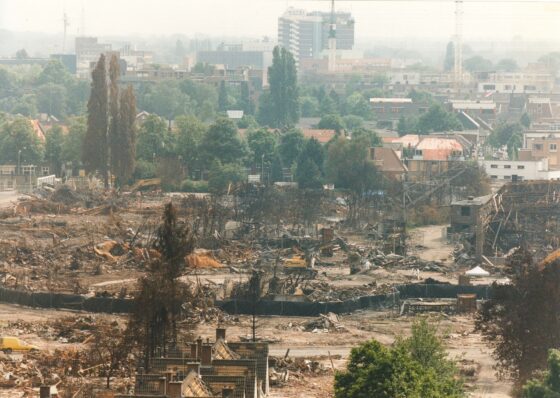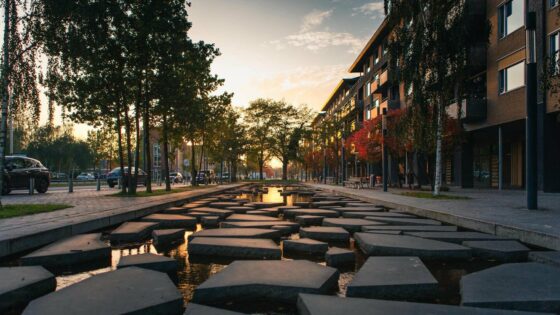25 years on, Enschede remembers its firework disaster
Clare Varney
On May 13, 2000, a series of explosions at a fireworks storage facility housed in a close-knit residential area ripped through the heart of Enschede. The repercussions are still felt today.
In total 23 people died, 1250 were left homeless, 200 homes were completely destroyed and a further 1500 badly damaged when what has become know as the Enschede firework disaster took place. The estimated repair bill: €600 million.
Twenty-five years later, the anniversary is an opportunity to reflect on so much loss, but also to celebrate a city’s regeneration.
It was a sunny Saturday afternoon and with temperatures hitting over 30°, many locals had left the city for nearby lakes. Some stocked up on beer and snacks for Eurovision Song Contest celebrations that evening. Children played football in the streets wearing their new FC Twente shirts in readiness for the all-important European playoff against Feyenoord the following day in Rotterdam, while others ate ice-cream or bought last-minute flowers for Mother’s Day.
One small fire
But at 3pm, one small fire changed everything.
The first of a number of fires was reported on Tollenstraat, home of SE Fireworks. Rescue services were on the scene in minutes, mindful of a major fire the previous day which had destroyed nearby furniture factory, Hartman Tuinmeubelen. Firemen worked swiftly to dampen the flames.
Raymond Slot was at the lakes in Nordhorn, just over the German border. “I felt the ground shake and saw this huge, thick black cloud in the sky. I thought an aeroplane had crashed in the Twente Airport. Only later when I returned home to my flat on the Deurningerstraat and talked to my mother, did I realise that the fireworks company had exploded.
“The whole area was completely destroyed including my family home which my parents had sold just six months before. I didn’t think there could have been such a devastating fireworks explosion. Not in a residential area so close to the centre of town.”

Despite receiving assurances at the time from directors Rudi Bakker and Willy Pater that only light, consumer fireworks were kept on the site, authorities later learnt that industrial grade fireworks used for pop concerts and recent millennium displays were stored there in huge concrete bunkers and shipping containers. In Tollenstraat, right in the heart of a residential area.
The blast
Witnesses saw “concrete and steel hurtling through the air, falling far into the surrounding area, punching holes in walls”.
Policeman, Loedie Ikink remembers the area “looking like a war zone. There was so much panic and fear. We thought the nearby Grolsch factory might also go up in flames”.
Young cameraman, Danny de Vries captured much of the blast and the immediate aftermath in video. Scenes which were broadcast across the world later that evening.
Volunteers help the wounded
Caroline Konings, a Red Cross volunteer since 1957, immediately summoned a war-time spirit and offered her services after hearing the first bang from the other side of town. “The biggest problem was communication,” she says. “Many of the injured were ‘guest workers’ from all over the world, with limited Dutch. People were panicking. They had lost their glasses. They were afraid of losing their house.
“All the victims were in shock. One man did not want to talk, but finally he burst into tears. He had seen the body of one of the firefighters hanging in a tree.
“Many needed treatment in local hospitals, but once released, where should they go? Many had no home to return to. A shelter was set up in a local sports hall. We created privacy, so people from different nationalities could mourn their loved one and come to terms with the enormity of their situation. Catholic nuns beside Muslims,” she says. “Each with their safe space.“
Bringing the city back to life
Lucien Baard was one of the first journalists on the scene and has just written a book De Vuurwerkramp (The Fireworks Disaster) in which he talks to many of those who survived.
“Enschede as a city has moved on, but there is still grief,” he tells Dutch News. “You can still see the pain in people’s eyes. The healing process is ongoing. The anniversary is nothing to celebrate. It’s a memorial day.”
“It’s not over,” he says. “A woman who lost her two children, father, mother and sister will never recover. And Furkan Temel, a young man I met for the first time this year, lost both his parents aged just two. The disaster is part of his life. He felt so angry and so full of grief, that he started painting as a form of therapy. His picture in the House of Stories café, features five birds – each, a member of his family, now flying free through the world. Just heartbreaking.”
Restrictions
Baard suggests that while people are looking forward to sharing their stories, the anniversary may also provide an opportunity for the country to re-examine current restrictions.

After all, the exact cause of the blast 25 years ago is still the subject of legal wrangling.
“Even now, twenty-five years later, Bakker, the former director of SE Fireworks (who was sentenced to one year in jail on appeal and later acquitted of negligence) is still fighting to clear his name,” Baard says. “A 36-year-old man, André de Vries, was jailed in 2002 for starting the fire but was also acquitted by appeal court judges a year later.”
“Holland has changed because of the fireworks disaster, but the violence, when people blow up bins, cars and houses, and throw fireworks at police and ambulance workers, continues. Dutch people think fireworks belong to our culture.
“Industrial fireworks (used for big shows) are no longer stored in the Netherlands. Instead, they are kept in old Nato bunkers in Germany. Lighter fireworks, however, which you can still buy legally at the end of December, have the potential to explode. And are still stored in residential neighbourhoods.
“This is what surprises me the most.”
Thank you for donating to DutchNews.nl.
We could not provide the Dutch News service, and keep it free of charge, without the generous support of our readers. Your donations allow us to report on issues you tell us matter, and provide you with a summary of the most important Dutch news each day.
Make a donation